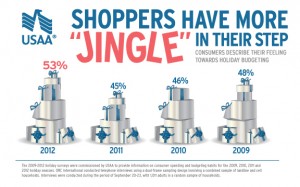 Americans have more pep in their step this Christmas. According to USAA’s fourth annual Holiday Spending Survey, consumers are more positive about their outlook this holiday gift giving season than last year and feel that they can spend wisely.
Americans have more pep in their step this Christmas. According to USAA’s fourth annual Holiday Spending Survey, consumers are more positive about their outlook this holiday gift giving season than last year and feel that they can spend wisely.
The financial giant’s findings were actually in line with recent reports from the National Retail Federation. The survey found that holiday sales are expected to grow above the current 10-year growth rate for holiday sales.
But, with this renewed optimism, there is a danger of overspending with credit cards when you could spend wisely. More people than ever before are planning on paying for some if not all of their Christmas gifts with their credit cards.
And, like always, most are not planning on paying off those credit card balances right away. So, how can you protect yourself from spending too much on your credit cards this holiday? Here are a few tips to help you spend wisely even while using credit cards during this holiday season.
USAA Survey Finds An Increase In Holiday Gift Giving
USAA’s Annual Holiday Spending Survey found that consumers plan to purchase more holiday gifts this year as opposed to what they bought last year. According to the survey, shoppers sentiment with respect to holiday shopping has become more positive this past year from surveys that were conducted in 2011.
For example, 40% of shoppers in 2010 reported that they had plans to scale back their holiday gift giving. Only 31% said they were scaling back their spending in 2011, and just 24% of Christmas shoppers said they were looking at reducing their spending in 2012.
Fewer Shoppers Are Making A Spending Plan
This year only 55% of all shoppers had a budget and a spending plan on how much and who they were giving gifts for this year. This was a worst percentage than the previous two years where 57% in 2011 and 61% in 2010 said they had a holiday gift giving budget. Despite the continued high unemployment and less than stellar financial markets, fewer holiday shoppers are planning to slow down on their holiday gift giving.
For three years in a row, holiday shoppers actually plan on increasing the number and amount of gifts that they are giving their friends, family, and loved ones. To make matters worse, shoppers are not making a spending plan or a budget when they set out to buy their gifts. This is the one place where I’ve strove to be better in my own financial life.
I have decided this year to write down every person that my wife and I are going to buy Christmas gifts for and to also list out the gift that we are buying in advance. Now that I have a budget and a plan, I can stick to what I plan on spending. This year is also one of the first years in a long time where I know exactly how much I am planning on spending.

 Debit cards are the
Debit cards are the 